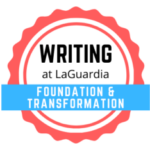-

Developing Thesis Statements, Topic Sentences, and Ideas for ENG 101 by Lalit Bajaj
To the Instructor: The goal of this exercise is to help students develop thesis statements, topic sentences, and ideas that belong in their respective paragraphs. I developed this idea after reading the text, Writing in College: From Competence to Excellence, found here, as part of O.E.R. In this exercise, students will read chapter 3, “Constructing…
|
-

Low-Stakes Reflection Assignment for ENG 259 by Juan Toro
This is a low-stakes assignment that chiefly asked my ENG 259 students –most of whom aspire to enter a world of science and engineering in the future– to reflect on how certain advances in technology are inaccessible to millions of human beings, which, unfortunately, could be fatal, as demonstrated by the current pandemic. This assignment…
|
-

In-Class Research and Writing Assignment on Susan Glaspell’s Trifles for ENG 102 by David Sibbitt
Analyzing a play, researching secondary sources, and preparing to write a full-length essay on Trifles Type of Assignment: Low-stakes, in-class writing and researching exercise Adapted From: Final exercise of Drama Unit available on OER Commons Required Reading / Watching: Susan Glaspell’s Trifles Text of Trifles accessed from Internet Archive Video of “A Jury of Her Peers”…
|
-

OER Assignment: Rhetorical Analysis of Whopper Virgins for ENG 101 by Christine Marks
Assignment Overview: I’ve developed this activity for my ENG 101 courses, which I currently teach on the theme of food and culture. In Fall 2023, I will participate in LaGuardia’s Humanitarian Initiative (the theme for the academic year 2022-23 is Food/Food Insecurity/Hunger/Environment affecting Food), and I hope to develop more OER assignments. To prepare students for…
|
-

Low-Stakes Assignment and In-Class Sequence on Ethics in Technical Communication for ENG 259 by Anna Voisard
Entry Point: https://gothamist.com/news/engineer-arrested-for-lying-about-inspection-of-crumbling-facade-that-killed-2-year-old Texts (to be read for homework): Textbook:Chapter 3, Open Technical Communication (OTC)https://softchalkcloud.com/lesson/serve/PySpCEBQodADFZ/html orhttps://alg.manifoldapp.org/read/open-technical-communication/section/8b530f4b-5942-4071-845a-0a138601da10 Article:“An Engineer’s Eureka Moment with a GM Flaw” by Bill Vlasichttps://www.nytimes.com/2014/03/29/business/a-florida-engineer-unlocked-the-mystery-of-gms-ignition-flaw.html Homework Assignment Read Chapter 3. Take note of the vocabulary (utility, rights, justice, and care) used todiscuss ethics. Read “An Engineer’s Eureka Moment with a GM Flaw” by…
|
-

Deceleration: 10-Minute Exercise–A Noteworthy Experience (Activity) by Lalit Bajaj
Directions: When you entered college, what was one noteworthy (important to you) experience you had? What did you learn from this experience? This experience doesn’t need to be big, but it does have to be an experience that taught you something. The experience can be as simple as meeting a fellow student or going to the…
|
-

Introduction to Academic Discourse: Reading Student Samples Against a Rubric by Marisa A. Klages-Bombich
Teaching Note: This activity is a modification of the one described by Jane E. Hindman in her 1999 article “Inventing Academic Discourse: Teaching (and Learning) Marginal Poise and Fugitive Truth.” This activity works best if you can draw on a stash of former papers for your class and is best done in small groups. You…
|
-

Introduction to Academic Discourse: Understanding a Writing Assignment Activity by Marisa A. Klages-Bombich
Teaching Notes: One of the issues many students have throughout college classes is that they often don’t understand what an assignment is asking of them. Slow down the class to really help students understand what your assignment is asking. For this assignment you might take part of your ENA class to ask students to read…
|
-

Introduction to Academic Discourse: email Activity by Marisa A. Klages-Bombich
Teaching Note: This activity is modified from the article “Academic English A Conceptual Framework: Technical Report-1” by Robin Scarcerella (2003). In this report, Scarcerella specifically discusses the challenges of students who are second language English speakers in terms of academic discourse and navigating the work of being a student. She provides readers with an email…
|



